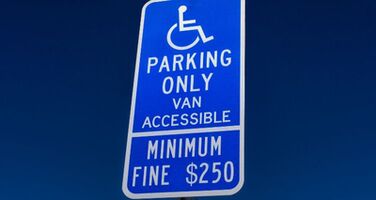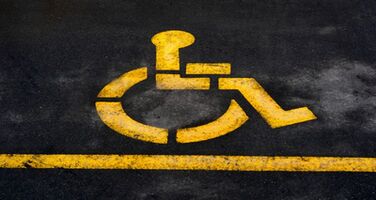
Handicap Placard Violations and Penalties in Maine: What You Need to Know
Disability tags, often called disability placards or disability parking permits, provide vital parking accommodations for individuals with mobility challenges. These tags allow holders to park in designated accessible parking spaces, which are often located near the entrances of buildings and provide extra room for assistive devices like wheelchairs or walkers. In ME, the use of these disability tags is regulated to ensure that they are used appropriately and only by those who truly need them.
However, despite the clear guidelines, disability tag violations are a common issue in many communities. Misuse of these tags not only causes inconvenience for individuals who genuinely need accessible parking but can also lead to hefty fines, penalties, and even legal action. In this article, we will explore the different types of handicap placard violations in Maine, the penalties associated with them, and how the state enforces these laws to maintain the integrity of accessible parking spaces. We will also provide answers to frequently asked questions (FAQs) and conclude with a summary of what you need to know to avoid violations.
Understanding Handicap Placards in Maine
What Are Disability Tags?
A disability tag is a special parking permit issued to individuals with qualifying physical disabilities. These permits allow the holder to park in designated accessible handicap parking spaces, which are clearly marked with the international symbol of accessibility (a blue and white wheelchair symbol). In ME, disability tags are issued by the Bureau of Motor Vehicles (BMV) and come with specific rules and regulations to prevent misuse.
Types of Disability Tags in ME
ME offers several types of handicap permits to accommodate different needs:
Permanent Disability Tags: These are issued to individuals with long-term or permanent disabilities and are valid for four years. They must be renewed upon expiration but do not require new medical certification if the disability status remains unchanged.
Temporary Disability Tags: These are issued for temporary disabilities, such as those resulting from surgery or injury, and are valid for up to six months. Renewing a temporary tag requires updated medical certification.
Disability License Plates: For individuals with a permanent disability who own a vehicle, disability license plates provide a more permanent solution and come with the same parking privileges as a tag.
Understanding the type of disability tag you hold and how to use it properly is crucial to avoid violations.
Who Is Eligible for a Disability Tag in Maine?
To qualify for a Maine handicap placard, applicants must meet specific medical criteria that impact their ability to walk or move freely. These criteria ensure that only those who genuinely need accessible parking receive it.
Common Eligibility Conditions:
- Inability to walk 200 feet without stopping to rest.
- Severe lung disease or chronic respiratory conditions that limit mobility.
- Use of portable oxygen for respiratory support.
- Severe cardiac conditions classified as Class III or IV by the American Heart Association.
- Loss or severe impairment of one or more limbs.
- Neurological or orthopedic conditions that significantly impair mobility.
- Legal blindness or severe visual impairments.
Medical Certification: A licensed healthcare provider must verify the applicant’s medical condition and certify that they meet the eligibility requirements. This certification is a critical part of the application process.
How to Apply for a Disability Tag in Maine
1. Obtain the Application Form: The Application for Disability Plates/Placards (Form PS-18) can be found on the state BMV website or picked up at a local BMV office.
2. Complete the Form: Fill out the applicant information section, including name, address, and contact details. Specify whether you are applying for a permanent or temporary tag or a disability license plate.
3. Medical Certification: Have the medical certification portion of the form completed by a licensed HandicapMD healthcare professional. This step verifies that your medical condition qualifies for a disability tag.
4. Submit the Application:
- In-person: Bring the completed form to a local state BMV office.
- By mail: Send the form to the address listed on the application or the BMV’s central office:
- Bureau of Motor Vehicles
Disability Clerk
29 State House Station
Augusta, ME 04333-0029
- Bureau of Motor Vehicles
5. Processing Time: Processing times can vary, but most applications are reviewed and approved within a few weeks. If approved, the BMV will issue your disability tag or plate.
6. Fees: Temporary and permanent tags are typically issued free of charge. Disability license plates, however, may involve the standard vehicle registration fees.
Common Violations of Disability Tag Use
Misusing a handicap placard is considered a serious offense in ME. Here are some common types of violations:
1. Using a Tag Without the Holder Present: One of the most frequent violations occurs when someone uses a disability tag without the person it was issued to being present. For example, if a family member or friend uses your tag to park in an accessible spot while you are not with them, this constitutes misuse. Disability tags are issued to specific individuals and can only be used when the permit holder is either driving or riding as a passenger in the vehicle.
Why It’s a Problem:
- Misuse reduces the availability of accessible parking spaces for those who genuinely need them.
- It contributes to public skepticism, making it harder for legitimate users to find parking and maintain their dignity.
2. Using an Expired or Invalid Tag: Disability tags have expiration dates, and it is illegal to use an expired or invalid tag. Even if you still qualify for a disability tag, you must renew it on time to avoid fines or penalties. Using a tag that has been altered, damaged, or rendered illegible is also considered a violation.
3. Altering or Forging a Disability Tag: Creating or altering a disability tag to gain access to accessible parking spaces is a serious offense. This includes using a counterfeit tag or modifying the expiration date of a legitimate tag. In ME, such actions are considered fraud and can lead to criminal charges.
4. Lending a Disability Tag to Someone Else: A common violation involves lending a disability tag to a friend or family member who does not have a qualifying disability. This misuse can result in penalties for both the person who lent the tag and the unauthorized user.
5. Parking in an Accessible Space Without Proper Display: Even if a person is eligible for accessible parking, failing to properly display the tag or plate can lead to a ticket. The tag must be clearly visible from the front windshield when the vehicle is parked. This rule applies even if you have a disability but forgot to bring your tag. Accessible parking spaces are reserved for individuals with visible, valid permits.
6. Parking in Unauthorized Areas: A disability tag does not grant permission to park in no-parking zones, fire lanes, or areas restricted for specific purposes (e.g., loading zones or tow-away zones). These rules apply even if a disability tag is displayed.
Penalties for Disability Tag Violations in Maine
ME has clear regulations for disability tag use, and violations are met with strict penalties to ensure compliance and protect the integrity of the program. Here’s what you need to know about the consequences of violating these rules.
1. Fines and Financial Penalties
- General Fines: Misuse of a disability tag or plate can result in fines ranging from $100 to $500, depending on the severity of the violation and whether it is a repeat offense.
- Higher Penalties for Fraud: Altering or forging a tag can lead to higher fines and potential criminal charges.
- First-Time Offense: Fines for a first-time offense can range from $200 to $500, depending on the severity of the violation. In some municipalities, the fines may be even higher to emphasize the importance of compliance.
- Repeat Offenses: Repeat offenders face increased fines and may be subject to additional penalties. The goal is to discourage continued misuse of disability tags.
2. Suspension or Revocation of the Tag: For serious or repeated violations, the state reserves the right to suspend or revoke a disability tag or plate if it has been misused or if fraudulent activity is detected. Revocation can make it more difficult for individuals to reapply and obtain a new placard in the future. This means that individuals who misuse their tag may lose their parking privileges, making it difficult to access essential services and facilities.
3. Legal Consequences for Severe Offenses: In cases of fraud, such as counterfeiting or altering a disability tag, offenders may face criminal charges. This can result in not only fines but also potential jail time and a permanent mark on the individual’s criminal record. ME law takes these offenses seriously to protect the integrity of the disability parking system.
4. Impact on Driving Record: Certain violations, such as using a fraudulent disability tag or parking in unauthorized areas repeatedly, may result in points added to the individual’s driving record, potentially affecting their insurance rates and driving privileges.
How Disability Tag Violations Are Enforced in Maine
Role of Law Enforcement and Parking Authorities
Local law enforcement officers and parking authorities are responsible for monitoring accessible parking spaces and ensuring compliance with disability tag regulations. Officers have the authority to issue tickets, fines, and warnings to individuals who violate the rules. They can also confiscate disability tags that are being misused.
Reporting Misuse of Disability Tags
Members of the public can play a role in maintaining the integrity of accessible parking spaces by reporting suspected misuse. If you witness someone misusing a disability tag, you can report it to local law enforcement or the BMV. Be prepared to provide details such as the location, vehicle description, and license plate number.
How to Report Disability Tag Misuse
If you suspect that someone is misusing a disability tag or plate, it’s important to report it to local law enforcement or the state BMV. Reporting violations helps protect the rights of individuals who genuinely need accessible parking.
Steps to Report Misuse:
- Document Details: Note the vehicle’s license plate number, location, and the time of the suspected misuse.
- Contact Local Authorities: Report the incident to local law enforcement or the state BMV, providing any relevant information.
- Stay Anonymous: Reports can often be made anonymously if you prefer not to reveal your identity.
How to Avoid Disability Tag Violations
To avoid penalties and ensure you are using your disability tag correctly, follow these best practices:
1. Display Your Tag Correctly:
- Proper Placement: Hang the tag from the rearview mirror when parked, ensuring that it is visible from the front windshield. Remove the tag when driving to prevent obstructed vision.
- License Plate Visibility: Ensure that disability plates are properly affixed and visible.
2. Use the Tag Only When the Holder Is Present: Only use the tag when the person to whom it was issued is either the driver or a passenger in the vehicle. Lending your tag to someone else is prohibited and can lead to penalties.
3. Renew Your Tag on Time: Be mindful of your tag’s expiration date and renew it before it expires. Permanent tags must be renewed every four years, while temporary tags require a new medical certification if an extension is needed.
4. Park Only in Authorized Spaces: Use your disability tag only for parking in designated accessible spaces. It does not allow parking in restricted zones such as fire lanes, loading docks, or private property without permission.
5. Report Lost or Stolen Tags: If your disability tag is lost or stolen, report it to the Maine BMV and apply for a replacement as soon as possible. This helps prevent unauthorized use and potential misuse under your name.
6. Educating Friends and Family About Proper Use: Ensure that your family and friends understand that your disability tag is for your use only. They should never use the tag to park in an accessible space unless you are with them.
Frequently Asked Questions (FAQs)
1. Can I use my disability tag in other states?
Yes, disability tags issued in ME are valid in all U.S. states under the Americans with Disabilities Act (ADA). However, make sure to follow local parking regulations, as time limits and rules for metered parking may vary.
2. How do I report someone misusing a disability tag?
You can report misuse to local law enforcement or the state BMV. Be ready to provide specific information, such as the vehicle’s location, license plate number, and a description of the misuse.
3. What should I do if my disability tag is lost or stolen?
If your disability tag is lost or stolen, contact the state BMV to apply for a replacement. It may also be helpful to file a police report, especially if the tag was stolen, to prevent potential misuse.
4. Do I need to renew my disability tag regularly?
Yes, permanent disability tags in ME must be renewed every four years, while temporary tags are valid for up to six months and require updated medical certification for renewal.
5. Are there any exceptions for emergency situations?
In emergency situations, law enforcement officers may use discretion when dealing with disability tag violations. However, it is always best to follow the rules to avoid misunderstandings or penalties.
6. What should I do if I accidentally use an expired disability tag?
If you accidentally use an expired tag, it’s best to renew it as soon as possible and avoid using it until it’s updated. An expired tag is considered invalid, and using it can result in fines.
7. Can I lend my disability tag to a friend or family member?
No, it is illegal to lend your tag to someone who does not have a qualifying disability, even if they are driving you. The tag can only be used when the eligible individual is present in the vehicle.
8. What are the consequences of altering a disability tag?
Altering or tampering with a disability tag is considered fraud and can lead to significant penalties, including fines, criminal charges, and potential imprisonment.
9. Can I park for free at metered spaces with a disability tag in ME?
While some areas may offer exemptions from parking fees for disability tag holders, this is not universal throughout Maine. Always check local ordinances to confirm parking fee rules.
10. What should I do if I see someone misusing a disability parking space?
Report suspected misuse to local law enforcement or the state BMV. Provide as much detail as possible, including the vehicle’s license plate number and the location of the incident.
Conclusion
Understanding the rules and regulations for using a handicap placard in Maine is essential for maintaining your parking privileges and avoiding potential violations. Disability tags are invaluable for individuals with mobility challenges, offering greater independence and convenience. However, misuse or failure to comply with the state’s regulations can lead to serious penalties, including fines, revocation, and even criminal charges.
By following best practices for displaying and using your disability tag and renewing it on time, you can make the most of its benefits while ensuring that accessible parking remains available for everyone who needs it. If you suspect misuse, don’t hesitate to report it to protect the integrity of the program and support the community of people with disabilities.
Use your disability tag responsibly and help maintain a fair and respectful parking system in ME. This not only benefits you but also upholds the integrity and availability of accessible parking for all.
.png)






